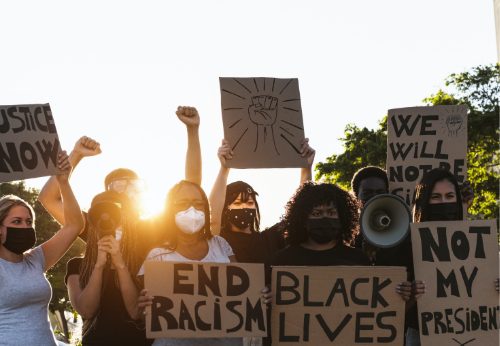
At The Bridge for Youth, we recognized the critical need for self-examination in the aftermath of the murder of George Floyd. Almost immediately, we formed a Racial Justice Cohort to embark on a soul-searching journey to understand where and how we need to improve upon fulfillment of our mission and the ways we support and work with youth, most of whom are Black, Indigenous, and People of Color. We ultimately aim to shift and to impact the culture of The Bridge to be a more accurate reflection of our mission and values, while highlighting the voices of the youth and staff. The Cohort, made up of representative board, staff, administration and youth, drafted a set of priorities in 4 areas: structure and governance, programming, human resources, and community relations/communications (Download PDF).
As a first step, the cohort is engaged in a process led by Dr. Raj Sethuraju, noted specialist in restorative justice and conflict resolution as seen through a racial equity lens. Using “listening circles,” the process facilitates constructive dialogue designed to build trust and community. These circles have brought forward enlightening insights. Next, we will set a collective racial justice vision and take a deeper dive into reviewing policies and procedures, governance guidelines, and programmatic areas, to identify ingrained organizational bias. Actions to dismantle these biases will follow that review.
Here at The Bridge, we are on an intentional journey in our commitment to advance racial justice. We will continue to provide updates on the Cohort’s progress in this important and transformational process for The Bridge for Youth.
Racial Justice Cohort Opportunities
This information was collected based on feedback from the Racial Justice Cohort (RJC) – Black, Indigenous, and People of Color (BIPOC) youth, staff, and board in July 2020. These opportunities also reflect the voice of BIPOC staff from listening sessions during the summer 2020 with new Executive Director, Lisa Mears. The Bridge gleaned additional insight during a number of healing circles held in January and February 2021 with board and staff, led by consultant Dr. Raj Sethuraju, noted specialist in restorative justice and conflict resolution as seen through a racial equity lens. This is not an exhaustive list of priorities, rather it is a preliminary draft vetted by the Cohort to frame the immediate and long-term focus of RJC.
Structure and Governance
- Establish cohort norms/rules/expectations
- Define racial justice at / for BFY and establish position (vision) statement
- Establish goals and finalize priorities for the cohort
- Define ideal governance structure
Programming @ BFY
- Evaluate BIPOC youth retention rate in programs
- Identify supportive services for youth in response to their trauma
- Address micro-aggression toward youth of color
- Develop equity in the acceptance, rights and needs in youth of color in comparison to the LGBTQ youth
- Address biases and competencies in white staff, particularly females, working with youth of color, particularly males
- Evaluate and make adjustments to the law enforcement policy in programs
Human Resources
- Evaluate BIPOC staff hiring and internal opportunities (training, promotions, etc)
- Evaluate BIPOC staff retention rates and address disparities
- Address micro-aggression toward staff of color
- Identify and address staff bias in in the workplace
- Review BFY’s HR policies, hiring and employment practices for equity
- Succession plan to engage BIPOC board members in executive board leadership
Community Relations / Communications
- Elevate voice of black and brown youth in the community to inform change
- Finalize organizational platform regarding racial justice and reform
- Initiate more broad conversations about BFY’s involvement in and support of Black Lives Matter
- Repair reputation / relationships in community and within BFY

